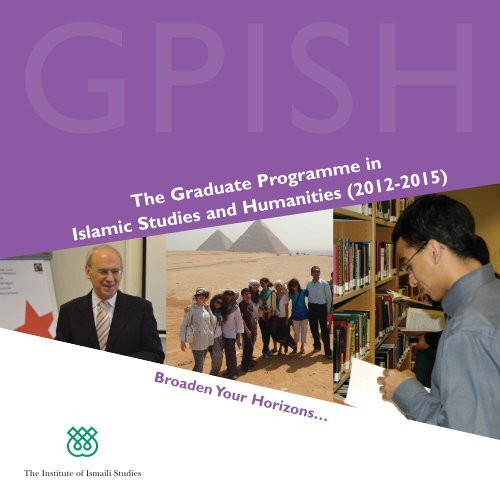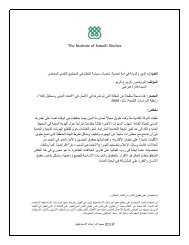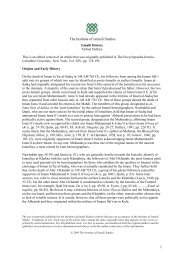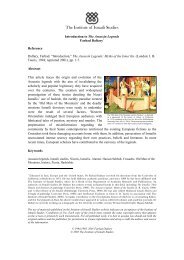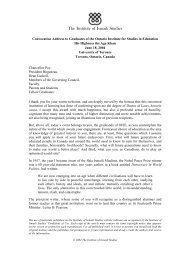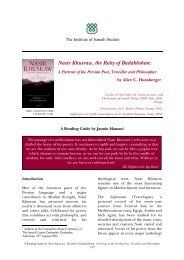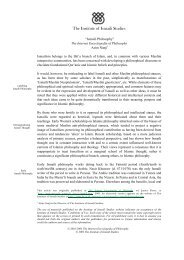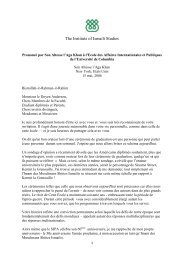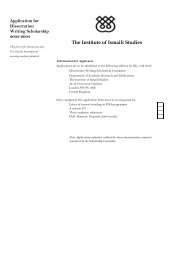GPISH prospectus 2011_Layout 1.qxd - The Institute of Ismaili Studies
GPISH prospectus 2011_Layout 1.qxd - The Institute of Ismaili Studies
GPISH prospectus 2011_Layout 1.qxd - The Institute of Ismaili Studies
You also want an ePaper? Increase the reach of your titles
YUMPU automatically turns print PDFs into web optimized ePapers that Google loves.
<strong>GPISH</strong><br />
<strong>The</strong> Graduate Programme in<br />
Islamic <strong>Studies</strong> and Humanities (2012-2015)<br />
Broaden Your Horizons…
Introduction<br />
<strong>The</strong> Graduate Programme in Islamic <strong>Studies</strong> and Humanities is an interdisciplinary<br />
programme devoted to the study <strong>of</strong> Islam – its heritage and contemporary issues.<br />
It <strong>of</strong>fers foundational modules in the study <strong>of</strong> religion, and the history, thought,<br />
literature, and art <strong>of</strong> Muslim societies, as well as specialized modules on Shi‘i and<br />
<strong>Ismaili</strong> studies. <strong>The</strong> aim <strong>of</strong> the programme is to engender an empathetic and critical<br />
examination <strong>of</strong> issues facing contemporary Muslims, from the intellectual debate<br />
regarding the re-examination <strong>of</strong> aspects <strong>of</strong> Islamic heritage to the challenges to<br />
modernization and development.<br />
<strong>The</strong> programme brings to bear the analytical frameworks and critiques <strong>of</strong> the social<br />
sciences and humanities as they apply (or fail to apply) to the study <strong>of</strong> the<br />
phenomenon <strong>of</strong> religion in its various aspects. It thereby seeks to integrate the<br />
discourse <strong>of</strong> academic disciplines such as history, anthropology, political science,<br />
philosophical analysis, literature, aesthetics, art, and the study <strong>of</strong> religion, into the<br />
study <strong>of</strong> Muslim societies.<br />
<strong>The</strong> programme is committed to the reality <strong>of</strong> the diversity <strong>of</strong> Muslim societies<br />
whether deriving from geographical or historical factors, perspectives on scriptural<br />
interpretation or intellectual, aesthetic or individual experiential orientations. An<br />
area <strong>of</strong> particular focus is the study <strong>of</strong> Shi‘i Islam and specifically the study <strong>of</strong> the<br />
<strong>Ismaili</strong> community, its history and its teachings, as understood within the broader<br />
context <strong>of</strong> Muslim history and culture.<br />
<strong>The</strong> Graduate Programme combines intellectual training with exposure to practical<br />
and field issues in the contemporary context. It is designed to train individuals to<br />
play an important role in academic, institutional and community life. <strong>The</strong> programme<br />
acts as both a preparation for a research degree and as a stepping stone to a variety<br />
<strong>of</strong> career opportunities around the world.<br />
Introduction<br />
3
Programme<br />
Language Study: Arabic or Persian<br />
Arabic is compulsory in the first two years <strong>of</strong> the programme for all students not pr<strong>of</strong>icient<br />
in this language. <strong>The</strong> Department runs three levels <strong>of</strong> Arabic and students are placed<br />
according to their prior knowledge and experience. <strong>The</strong> overall aim is to equip students<br />
with the skills needed to read primary texts in Arabic in different disciplines and from<br />
different periods. Prior to the start <strong>of</strong> the first year, students undertake a four week<br />
Intensive Arabic Pre-sessional course at the IIS. At the end <strong>of</strong> the first year, students<br />
participate in a summer Arabic immersion programme in Syria.<br />
Students who are already fluent in Arabic take Persian, in order to read and understand core<br />
Persian texts. Persian language study includes participation in a summer Persian immersion<br />
programme in Iran. Students may also have the opportunity to study other languages used in<br />
Muslim societies.<br />
First Year<br />
<strong>The</strong> first year <strong>of</strong> the programme consists <strong>of</strong> sustained language learning in Arabic or Persian,<br />
along with the following core modules:<br />
Core modules<br />
4<br />
Programme<br />
> Introduction to Islamic <strong>Studies</strong> and Humanities: <strong>The</strong> module is designed to introduce students<br />
to the study <strong>of</strong> religion, specifically Islam and the <strong>Ismaili</strong> Tariqah through humanities<br />
perspectives. It will engage in a critical sociological and philosophical examination <strong>of</strong> Muslim<br />
history. Students will also examine approaches to religious hermeneutics (including the varying<br />
interpretations <strong>of</strong> Quranic passages), issues relating to religious instruction and belief, and<br />
contemporary developments.<br />
> Authority, Power and Body Politic I and II: Islamic history is delivered as two modules, across<br />
two terms. <strong>The</strong>se modules aim to: familiarize students with the main stages in the<br />
emergence, development and spread <strong>of</strong> Islam, both as a religion and as a political and<br />
social system in the pre-modern and modern periods; to introduce classical Islamic<br />
religious, political and social institutions; and to establish a framework for the study <strong>of</strong><br />
Islamic history.
History <strong>of</strong> the <strong>Ismaili</strong>s: This module provides a survey <strong>of</strong> <strong>Ismaili</strong> history from the earliest<br />
periods to early modern times. Starting with the pre-Fatimid period in <strong>Ismaili</strong> history, it<br />
then covers the Fatimid period itself when <strong>Ismaili</strong> thought and literature attained their<br />
summit and made important contributions to Islamic thought and culture. It then<br />
examines the so-called Alamut period in Nizari <strong>Ismaili</strong>s history when this branch <strong>of</strong><br />
<strong>Ismaili</strong>sm managed to establish a viable state in Iran and Syria. During the Alamut period<br />
II the Nizari <strong>Ismaili</strong> made important contributions to Islamic civilization. <strong>The</strong> final part <strong>of</strong><br />
the module focuses on the post-Alamut period in Nizari <strong>Ismaili</strong> history when the <strong>Ismaili</strong>s<br />
lived in scattered communities from Syria to South Asia.<br />
> Approaches to the Study <strong>of</strong> Religion: <strong>The</strong> emergence <strong>of</strong> ‘religion’ as an analytical category or<br />
as an object <strong>of</strong> study is deeply associated with the advent <strong>of</strong> modernity. Given that<br />
modernity is the core problematic <strong>of</strong> social theory, the study <strong>of</strong> religion demands<br />
acquaintance with this body <strong>of</strong> theory. This course is aimed to <strong>of</strong>fer a critical overview<br />
<strong>of</strong> different theoretical and methodological approaches to the study <strong>of</strong> religions. It<br />
engages in a comprehensive overview <strong>of</strong> thinkers from the phenomenology <strong>of</strong> religion,<br />
philosophy, hermeneutics and the social sciences, including Marx, Nietzsche, Freud, Eliade,<br />
Gadamer, Derrida, Habermas and Gramsci and seeks to situate these differing<br />
contributions within the ‘discourse on modernity’.<br />
> Anthropology <strong>of</strong> Muslim Societies: An introduction to the anthropological study <strong>of</strong> Muslim<br />
societies and Islam through close readings <strong>of</strong> ethnographic texts from a variety <strong>of</strong> regions.<br />
This module aims to explore the diversity, complexity, and dynamism <strong>of</strong> Muslim societies. For<br />
this purpose, the module shall survey ethnographic materials and review how general<br />
theories are applied to specific localities and everyday contexts. This module will expose the<br />
students to some <strong>of</strong> the key themes and methods that anthropologists <strong>of</strong> Muslim societies<br />
have explored. It will survey a select yet broad range <strong>of</strong> topics, countries, and Muslim<br />
communities. <strong>The</strong> students will be encouraged to think critically, creatively, and comparatively<br />
across the topics, countries, and communities covered throughout the module.<br />
5<br />
> Muslims in Regional Contexts (South Asia/Africa): A significant characteristic <strong>of</strong> Islam,<br />
throughout its history, has been the plurality and diversity <strong>of</strong> its adherents. Although the<br />
fundamental tenets <strong>of</strong> Islam, expressed through the shahada, are common to all Muslims,<br />
the way Islam is practised in different regions <strong>of</strong> the world reflects the interpretation <strong>of</strong><br />
the people and the interaction <strong>of</strong> their beliefs with the pre-established culture. <strong>The</strong> aim<br />
<strong>of</strong> the module is to explore such varieties <strong>of</strong> expression with reference to practices in<br />
South Asia/Africa.<br />
Programme
Knowledge, World, Action: <strong>The</strong> aim <strong>of</strong> this module is, via the examination <strong>of</strong> a number <strong>of</strong><br />
traditional topics and problems in Western Philosophy, to acquaint the student with the<br />
methods <strong>of</strong> analysis and criticism that characterise contemporary Western Philosophical<br />
thought. Topics covered will be: truth and reasoning; the problem <strong>of</strong> induction; causation;<br />
time; free will; scepticism about the external world; the analysis <strong>of</strong> knowledge; philosophy,<br />
ethics and insight; and the grounds <strong>of</strong> political obligation.<br />
> Gender and Representation: This module will introduce students to the key debates and<br />
thinkers on Islam and gender. <strong>The</strong> subject will be approached from two perspectives. <strong>The</strong><br />
first half <strong>of</strong> the module will focus on the ideological discourses that surround this subject<br />
and the role <strong>of</strong> scriptures in legitimising/de-legitimising competing ideologies. Such debates<br />
<strong>of</strong>ten fail to go beyond the rhetoric and stated ideals to explore the translation <strong>of</strong> these<br />
ideologies into lived realities and the negotiations that shape ‘life as lived’. <strong>The</strong> second half <strong>of</strong><br />
the module will hence help students explore lived Islam, particularly as it pertains to gender<br />
roles, relations and identities, in the light <strong>of</strong> the competing ideologies discussed in the first<br />
half <strong>of</strong> the module.<br />
6<br />
Programme<br />
> Literature and Culture: <strong>The</strong> aim <strong>of</strong> this module is to provide an introduction to literary<br />
analysis and cultural argument. <strong>The</strong> module is not a survey or history <strong>of</strong> literary and<br />
cultural theory. It seeks, rather, to develop the analytical skills required to engage<br />
seriously with literary and critical texts. <strong>The</strong> emphasis will be on careful examination<br />
through group discussion <strong>of</strong> key arguments and textual passages.<br />
> <strong>Ismaili</strong> Philosophy: This module aims to locate ‘<strong>Ismaili</strong> Intellectualism’ within the larger<br />
framework <strong>of</strong> religious thinking and its relation to Islamic philosophy and theology. It<br />
distinguishes between two approaches to the study <strong>of</strong> ‘<strong>Ismaili</strong>sm’; those adopted by<br />
Orientalists and the insider vision and self portrayal.<br />
> Modern Islamic Thought: This module traces significant developments in Islamic thought<br />
during the modern period. It seeks to develop an awareness <strong>of</strong> illustrative trends, methods<br />
and ideas in contemporary Islamic thought focusing on the long 20th century, highlighting its<br />
dynamism and diversity, from Islamists to their intellectual opponents, who also work in an<br />
Islamic idiom. It encourages a contextual approach that underlines the complexities and<br />
nuances <strong>of</strong> Islamic positions, and develops an appreciation <strong>of</strong> the central concerns and<br />
persistent problematics <strong>of</strong> modern Islamic thought. It also seeks to encourage an<br />
awareness <strong>of</strong> the shifting backgrounds and credentials <strong>of</strong> would-be spokespersons for<br />
Islam in the modern period.
Second Year<br />
<strong>The</strong> second year <strong>of</strong> the programme builds upon the foundations laid in the first year and <strong>of</strong>fers<br />
more specialized modules and electives, with a continued commitment to language learning.<br />
Core modules<br />
> <strong>The</strong> Qur'an - Meaning, History and Text: <strong>The</strong> module aims to provide a basic introduction<br />
to the major issues confronting the student <strong>of</strong> the scripture <strong>of</strong> Islam. <strong>The</strong> first half <strong>of</strong> the<br />
module presents the traditional account <strong>of</strong> the canonization <strong>of</strong> the Qur’an, its<br />
arrangement, style, self-identification, basic doctrines, and how it functions as a source <strong>of</strong><br />
Islamic law and theological teaching. <strong>The</strong> second half focuses more specifically on the<br />
variety <strong>of</strong> critical methodologies that have been used in modern Qur’anic studies, linking<br />
these to precedents in the field <strong>of</strong> Biblical studies. <strong>The</strong> module closes with an<br />
introduction to the ‘theologies <strong>of</strong> the Qur’an’, ie: the long running Kalam discussion <strong>of</strong><br />
concepts such as the scripture’s miraculous inimitability (I’jaz al-Qur’an) and<br />
uncreatedness (qidam al-Qur’an).<br />
> Topics in the Philosophy <strong>of</strong> Religion: This module is intended to develop the kind <strong>of</strong> analytical<br />
thinking which is relevant to the concepts found in religious discourse. <strong>The</strong> relation<br />
between religious and secular culture is explored and the terms, themselves, analysed.<br />
Students read major philosophers, whose ideas have had an explicit or tacit relationship<br />
to issues <strong>of</strong> importance in religion. <strong>The</strong>se will range from Plato and Aristotle, through<br />
representatives <strong>of</strong> the medieval philosophical tradition common to the scriptural faiths,<br />
to philosophers who have been influential in the shaping <strong>of</strong> the modern world, from<br />
Hume and Kant to Heidegger and Wittgenstein.<br />
“Unlike traditional<br />
academic institutions,<br />
<strong>GPISH</strong> <strong>of</strong>fers a rare<br />
opportunity to experience<br />
an education that aimed<br />
at bypassing traditional<br />
boundaries <strong>of</strong> disciplines to<br />
enrich your thought with<br />
broadness <strong>of</strong> knowledge<br />
and understanding.<br />
Now I am very confident<br />
about benefitting from<br />
my training in Humanities<br />
and Islamic <strong>Studies</strong><br />
in my future career in<br />
architecture and<br />
development.”<br />
Wisam Elhamoui<br />
(Class <strong>of</strong> <strong>2011</strong>)<br />
7<br />
Programme
Art and Architecture <strong>of</strong> Muslim Societies: <strong>The</strong> module will focus on the formation <strong>of</strong> political<br />
and religious identity through the medium <strong>of</strong> art architecture. It will examine monuments<br />
constructed within the Muslim sphere, focusing on key buildings and particular building<br />
types that were <strong>of</strong> particular importance in the development <strong>of</strong> such an identity. <strong>The</strong><br />
lectures will be divided typologically, examining in turn structures <strong>of</strong> both secular and<br />
religious function, and exploring themes to include the transference and meaning <strong>of</strong> form,<br />
the notion <strong>of</strong> paradise and the importance <strong>of</strong> light, the projected identity <strong>of</strong> rulers, the<br />
formation <strong>of</strong> religious and political identity and the iconography <strong>of</strong> decoration.<br />
> Research Design and Methods: This module is an introduction to qualitative research<br />
methods. Through active engagement with the research process, the module encourages<br />
critical reflection at all stages. <strong>The</strong> main aim <strong>of</strong> the module is to facilitate the process <strong>of</strong><br />
designing a research proposal for a small-scale field-based empirical study and to provide<br />
students with the knowledge and skills to carry out the study and write an in-depth<br />
report based on the field research.<br />
8<br />
> Topics in the Islamic Intellectual Tradition: This module surveys the fields <strong>of</strong> inquiry known<br />
in Arabic as kalaam and falsafa, which are usually translated as Islamic theology and<br />
philosophy. <strong>The</strong> module will explore the subject matter and problems <strong>of</strong> these fields <strong>of</strong><br />
inquiry through selections from English translations <strong>of</strong> key texts. Topics to be covered<br />
will include God, prophecy, creation, ethics, the role <strong>of</strong> reason, nature and causality, human<br />
free-will versus divine omnipotence, the problem <strong>of</strong> evil, and the conflict between falsafa,<br />
whose origins lie in translations <strong>of</strong> Greek texts into Arabic and kalaam, which represents<br />
a rational religious view <strong>of</strong> the world inspired by the religion <strong>of</strong> Islam, and “orthodox”<br />
opposition to any rationalist inquiry <strong>of</strong> revealed faith.<br />
Programme<br />
“<strong>GPISH</strong> provides students with a unique opportunity to be both<br />
immersed in an <strong>Ismaili</strong> setting, while looking at it through a scholarly<br />
lens. <strong>GPISH</strong> will challenge the way one looks at the world and<br />
encourage students to think in new ways.”<br />
Rozina Kanchwala<br />
Class <strong>of</strong> <strong>2011</strong>
Religion, Law and Society: This module, on the one hand, examines parts <strong>of</strong> the legal history<br />
and heritage <strong>of</strong> Islam and the development <strong>of</strong> the tradition <strong>of</strong> Islamic law (including Shi‘a<br />
and <strong>Ismaili</strong> law); and on the other hand, reflects upon the nature and concept <strong>of</strong> law<br />
coming from this heritage and its influence on other aspects <strong>of</strong> society. Three broad<br />
topics are covered in this module: the history <strong>of</strong> Islamic legal thought from the formative<br />
period; the crystallisation <strong>of</strong> Islamic legal thought into works <strong>of</strong> fiqh and usul al-fiqh; and,<br />
comparative law and legal orders.<br />
> <strong>Ismaili</strong>s in Modern Times: An exploration <strong>of</strong> the history <strong>of</strong> the <strong>Ismaili</strong> Imamat and the<br />
<strong>Ismaili</strong>s in the late-modern period (late 18th century to the present) and an examination<br />
<strong>of</strong> how this legacy bears on contemporary concerns. Particular attention is paid to<br />
regional studies <strong>of</strong> <strong>Ismaili</strong>s residing in different parts <strong>of</strong> the world, following diverse<br />
traditions.<br />
> Shi'i Islam - History and Doctrines: <strong>The</strong> aim <strong>of</strong> this module is to provide a comprehensive<br />
overview <strong>of</strong> the historical development <strong>of</strong> the various Shi‘i groups and a thorough<br />
analysis <strong>of</strong> their religious doctrines, religious law and rites and rituals. <strong>The</strong> module will<br />
explore the important interaction <strong>of</strong> religious and secular authority in the formation <strong>of</strong><br />
a particular Shi‘i identity. It will also highlight the important interdependence <strong>of</strong> religious<br />
and community identities among the Shi‘a. It includes an examination <strong>of</strong> the historical<br />
development <strong>of</strong> Shi‘i groups as well as more recent developments such as the rising<br />
power <strong>of</strong> the ulama’, culminating in the 1979 Islamic Revolution <strong>of</strong> Iran and the<br />
establishment <strong>of</strong> a theocratic state there.<br />
9<br />
Programme
Electives<br />
<strong>The</strong> availability <strong>of</strong> elective modules depends on student interest. <strong>The</strong>refore, not<br />
all modules are <strong>of</strong>fered every year.<br />
> Education and Muslim Societies: How ought emerging generations <strong>of</strong> Muslims to be<br />
educated? This question has posed a fundamental and standing challenge to the social<br />
reform agenda <strong>of</strong> Muslim states and communities in the modern period. Pressed with the<br />
imperative <strong>of</strong> delivering universal education to their constituencies, policy-makers and<br />
educators in Muslim countries have resorted to diverse strategies <strong>of</strong> educational reform.<br />
<strong>The</strong> models <strong>of</strong> responses that have emerged reveal different forms <strong>of</strong> relationships that have<br />
been forged between historical and contemporary conceptions <strong>of</strong> education, justified by<br />
contrasting understandings <strong>of</strong> what constitutes the ‘educated Muslim’ in the modern age.<br />
<strong>The</strong> aim <strong>of</strong> this module is to interrogate these responses, and to identify the issues and<br />
implications that have arisen as a consequence.<br />
> Topics in International Development: <strong>The</strong> module aims to introduce and explain historical<br />
and modern efforts in national and international development, elaborating on the<br />
important issues and challenges confronting the international community. It will also<br />
examine how these issues and challenges are being addressed by different stakeholders<br />
and to what effect.<br />
10<br />
Programme<br />
> Human Rights, Civil Society, Islam: <strong>The</strong> notions <strong>of</strong> human rights and civil society are central<br />
to modern political philosophy. This module will examine the debate amongst Muslim<br />
intellectuals and leaders regarding the applicability <strong>of</strong> these notions to "Islamic" societies.<br />
Students will also review the actual contemporary state <strong>of</strong> affairs with regards to these<br />
notions in Muslim countries through reports <strong>of</strong> international and local organizations.<br />
> <strong>The</strong> Age <strong>of</strong> the Fatimids: <strong>The</strong> module will take a multi-faceted, thematic approach to the<br />
Fatimids, addressing their historical origins, the religious and social organisation <strong>of</strong> their<br />
state, and the centrality <strong>of</strong> the Imam. It will also focus on their cultural contributions and<br />
their encounters with neighbouring dynasties and empires, particularly the Umayyads, the<br />
Abbasids and the Byzantines, before concluding with a summary <strong>of</strong> the development <strong>of</strong><br />
the Nizaris and Musta’lis after the schism <strong>of</strong> 1094CE.
Islamic Cities - History, Culture and Development: This module looks at the development <strong>of</strong><br />
cities, within the Islamic context, from a cultural perspective. Tracing the development <strong>of</strong><br />
cities and cultures from the seventh century, it analyses the diverse traditions around the<br />
world as they developed and interacted with each other. It also explores the<br />
commonalities and divergences between Islamic and Christio-European cultures. <strong>The</strong><br />
theoretical discussions are complemented by case studies from Aleppo, Fes, Cairo and<br />
the Aga Khan Historic Citiesprogramme.<br />
> Tasawwuf - <strong>The</strong> Mystical Dimension <strong>of</strong> Islam: This module introduces thesalient features <strong>of</strong><br />
the Sufi mystical tradition within Islam. It will cover the historical background <strong>of</strong> the<br />
tradition, the foremost personalities who played a major role in its development, the<br />
primary concepts promoted in Sufism and their manifestation in both a religious and<br />
social context, as well as the classical works that present both Sufi theory and practice.<br />
<strong>The</strong> relevant issues are approached through a close reading <strong>of</strong> passages from classical<br />
texts and form the basis for conceptual analysis and intensive discussion.<br />
> Muslims in Regional Contexts - Central Asia: A range <strong>of</strong> topics including: dispelling myths;<br />
Central Asian societies in transition; the challenges <strong>of</strong> poverty; traditional institutions, local<br />
government, devolution and decentralization; association, expression, ownership and<br />
empowerment; gender and developments; education, employment and unemployment;<br />
social capital and human resource development will be covered in this module.<br />
11<br />
“<strong>GPISH</strong> is all about learning to find out what you are passionate about<br />
and pursuing it. It exposes you to a variety <strong>of</strong> disciplines that open up<br />
various possibilities. If you believe in growing through your education,<br />
<strong>GPISH</strong> is definitely going to facilitate that.”<br />
Naureen Ali<br />
Class <strong>of</strong> 2013<br />
Programme
Field projects carried out by<br />
students include:<br />
‘First STEPs: A Portrait <strong>of</strong> a STEP Teacher<br />
in Khorog, Tajikistan’<br />
12<br />
‘Being <strong>Ismaili</strong> in the Democratic Republic<br />
<strong>of</strong> Congo: Identity Maintenance amongst<br />
Gujarati <strong>Ismaili</strong>s in Kinshasa’<br />
‘Development Projects in the Rural Areas:<br />
<strong>The</strong> Case Study <strong>of</strong> Mini Hydropower<br />
Stations in Gorno- Badakhshan<br />
Autonomous Oblast, Tajikistan’<br />
‘What are the Influences on the<br />
Education <strong>of</strong> <strong>Ismaili</strong> Girls Living<br />
in Dushanbe?’<br />
‘<strong>The</strong> Trading Route <strong>of</strong> Kulma-Karakorum<br />
Connecting Tajikistan and China’<br />
‘Examining Attitudes towards Scientific<br />
Naturalism and its Relationship<br />
to Religion’<br />
‘Religious Activities <strong>of</strong> Contemporary<br />
<strong>Ismaili</strong> Women in Iran: Doreh Quran’<br />
Programme<br />
Field Projects<br />
<strong>The</strong> field project is an integral part <strong>of</strong> the Graduate Programme and is designed to<br />
encourage each student to formulate and conduct a research project which can serve as a<br />
basis for continued post-graduate study or career development. Students will conduct<br />
research during the summer <strong>of</strong> their second academic year. <strong>The</strong> field project is an<br />
opportunity for students to produce an original piece <strong>of</strong> research.<br />
A research supervisor is allocated to each student to guide them in planning, preparing,<br />
conducting and writing up their field reports. A module on Research Design and Methods is<br />
also taught in the second year to provide students with the necessary tools to plan and conduct<br />
an empirical study.Towards the completion <strong>of</strong> this module, students will be expected to submit<br />
a project proposal, including a budget proposal for their project. Each student’s project has to<br />
be approved by a committee comprising <strong>of</strong> the Course Director, Module Convenor and<br />
Research Supervisor. Approved projects are awarded modest funding to contribute to the cost<br />
<strong>of</strong> travel to and from the place <strong>of</strong> research and project-related expenses.<br />
Students will be evaluated on the presentation <strong>of</strong> their research project, in the form <strong>of</strong> a<br />
report <strong>of</strong> 10,000 words. <strong>The</strong> report will be evaluated by an internal examiner and an<br />
external examiner. Students must pass the field project in order to be conferred with the<br />
IIS’s post-graduate award in Islamic <strong>Studies</strong> and the Humanities. Students should also be<br />
aware that funding for their Master's work in the third year is dependent on the timely<br />
receipt <strong>of</strong> their research reports.<br />
Language Immersion trips<br />
<strong>The</strong> study <strong>of</strong> Arabic (Persian for those fluent in Arabic) is central to the programme as it<br />
enables students to read and understand the Qur’an and other primary texts. In addition to<br />
two years <strong>of</strong> language training at the IIS, students also attend a four week intensive language<br />
immersion programme in Syria (Iran for those studying Persian) at the end <strong>of</strong> their first year.<br />
In the past students have also attended language immersion programmes in Morocco, Egypt,<br />
Tunisia and Yemen. This is an opportunity for students to immerse themselves in the<br />
language and culture <strong>of</strong> an Arab country.<br />
Students have carried out field projects in: Australia ► Canada ► China ►<br />
Egypt ► Germany ► India ► Iran ► Japan ► Kenya ► Kyrgyzstan ► Lebanon ►<br />
Malaysia ► Mali ► Morocco ► Pakistan ► Switzerland ► Syria ► Tajikistan ►<br />
Tanzania ► Turkey ► Uganda ► UK ► USA ► Yemen ►
Over the past three years, the following<br />
presentations have been made by<br />
<strong>GPISH</strong> students at conferences<br />
around the world:<br />
“Portraiture as Diplomatic Communication<br />
in the time <strong>of</strong> Mehmed II” Sabrina A.<br />
Bandali (Class <strong>of</strong> 2008)<br />
International Congress<br />
<strong>of</strong> Turkish Art<br />
– September 2007<br />
“Belonging to the Nation’ A Perspective<br />
From the Pamir, Tajikistan”<br />
Laila Kadiwal (Class <strong>of</strong> 2009)<br />
AMSS UK<br />
conference - March 2009<br />
“Home Away From Home: <strong>The</strong> Return<br />
<strong>of</strong> <strong>Ismaili</strong> Muslims to Uganda”<br />
(A documentary film)<br />
Aleem Karmali (Class <strong>of</strong> 2009)<br />
Duke-UNC Graduate Islamic <strong>Studies</strong><br />
Conference - April 2009<br />
13<br />
Field Trips<br />
Students will undertake field trips in order to have a direct encounter with two <strong>of</strong> the<br />
societies being studied. First-year students visit Cairo, Egypt and second-year students visit<br />
Andalusia, Spain. Prior readings and orientation are complemented by a lecturer who<br />
accompanies students on these trips and to ensure that it is an academically and culturally<br />
enriching experience.<br />
Programme
Third Year Master’s degree<br />
Students spend the third-year studying for a Master’s degree at a UK degree granting<br />
university in a subject area that resonates with the aims <strong>of</strong> the Graduate Programme.<br />
Although no longer resident at the IIS, all third year students are considered to be students<br />
<strong>of</strong> the Department <strong>of</strong> Graduate <strong>Studies</strong>. Students must keep the Department aware <strong>of</strong> their<br />
academic progress and career plans. <strong>The</strong> Department may also invite third year students to<br />
return to the IIS to present their work.<br />
SOAS<br />
LSE<br />
<strong>Institute</strong> <strong>of</strong> Education<br />
University <strong>of</strong> Oxford<br />
University <strong>of</strong> Cambridge<br />
Other<br />
Sussex University<br />
University <strong>of</strong> Edinburgh<br />
UCL<br />
Goldsmiths College<br />
Kings College London<br />
Universities students have attended<br />
14<br />
Programme<br />
Disciplines students have pursued<br />
for their third year<br />
Social Sciences<br />
Anthropology<br />
Media<br />
Other Humanities<br />
Islamic <strong>Studies</strong><br />
Other<br />
Literature<br />
Education<br />
Law<br />
Political Science<br />
Development<br />
Architecture
Faculty<br />
<strong>The</strong> faculty comprises lecturers who have made significant contributions to scholarship and are<br />
engaged in innovative research projects in their respective fields. Each student is assigned an<br />
Academic Advisor, to provide them additional academic support. Lecturers include IIS and<br />
visiting scholars from leading international academic institutions:<br />
Dr. Shantha Arulanantham (IIS)<br />
Pr<strong>of</strong>. Ali Asani (Harvard)<br />
Dr. Jalal Badakschani (IIS)<br />
Dr. Karen Bauer (IIS)<br />
Dr. Stefano Bianca (AKTC)<br />
Dr. Stephen Burge (IIS)<br />
Pr<strong>of</strong>. Clive Bush (King's College/IIS)<br />
Dr. Alessandro Cancian (IIS)<br />
Dr. Farhad Daftary (IIS)<br />
Mr. Ibrahim M Darwish<br />
(Muslim College/IIS)<br />
Dr. Aziz Esmail (IIS)<br />
Pr<strong>of</strong>. Benjamin Fortna (SOAS/IIS)<br />
Dr. Laila Halani (IIS)<br />
Mr. Karim Javan (IIS/ISMC)<br />
Dr Reza Shah Kazemi (IIS)<br />
Pr<strong>of</strong>. Herman Landolt (IIS)<br />
Dr. Tullio Lobetti (SOAS/IIS)<br />
Ms Farhana Mayer (IIS)<br />
Dr. Toby Mayer (IIS)<br />
Anna Mc Sweeney (SOAS/IIS)<br />
Dr. Gurd<strong>of</strong>arid Miskinzoda (IIS)<br />
Dr. Farouk Mitha (IIS)<br />
Mr. Luay Mohammed (IIS/ISMC/SOAS)<br />
Mr. Abdul J Muhammed (Westminster/IIS)<br />
Zawahir Moir (IIS)<br />
Dr. Marodsilton Mubarakshoeva (IIS)<br />
Pr<strong>of</strong>. Eric Ormsby (IIS)<br />
Dr. Maryam Rezaee (IIS)<br />
Dr. Subir Sinha (SOAS/IIS)<br />
Dr. Suha Taji-Farouki (IIS/Exeter)<br />
Dr. Shiraz Thobani (IIS)<br />
Dr. Farouk Topan (SOAS/ISMC/IIS)<br />
Dr. Omar Ali-de-Unzaga (IIS)<br />
Pr<strong>of</strong>. Jerome Valberg (UCL/IIS)<br />
Dr Fayyaz Vellani (IIS<br />
Dr. Saeed Zeydabadi-Nejad (IIS/SOAS)<br />
15<br />
Faculty
Resources<br />
Department <strong>of</strong> Graduate <strong>Studies</strong><br />
<strong>The</strong> Head <strong>of</strong> Graduate <strong>Studies</strong> oversees all the activities <strong>of</strong> the department.<br />
<strong>The</strong> <strong>GPISH</strong> course director is directly responsible for all academic aspects <strong>of</strong> the<br />
programme and provides strategic input in all other aspects <strong>of</strong> the programme. Student<br />
Services are responsible for overseeing all student services, <strong>of</strong>fice systems, administrative<br />
matters related to student welfare such as accommodation, immigration and academic<br />
records within the department, and liaising with students and lecturers for assignments and<br />
grades. <strong>The</strong> English for Academic Purposes Co-ordinator works with all students to develop<br />
and enhance their critical reading and writing skills required for post-graduate studies. She<br />
coordinates the Khorog English Programme in Tajikistan which <strong>of</strong>fers language support and<br />
training for academic study in English. She also coordinates a similar programme in<br />
Damascus run jointly with the British Council.<br />
<strong>The</strong> administrator for the Department <strong>of</strong> Graduate <strong>Studies</strong> is responsible for all the<br />
financial dealings within the department, and is the first point <strong>of</strong> contact for financial issues<br />
such as receiving stipends, taking out loans or reimbursement <strong>of</strong> expenses. <strong>The</strong><br />
administrator is also responsible for timetabling, room bookings and maintaining and<br />
updating our Virtual Learning Environment (MOODLE).<br />
16<br />
In addition, each student is assigned an Academic Advisor, who provides individual academic<br />
support.<br />
Representatives from the student body sit on the <strong>GPISH</strong> Programme Board to ensure<br />
effective communication between the students and the department. Students also have<br />
access to a confidential welfare and counselling service. A student affairs fund supports<br />
cultural and social activities.<br />
Resources
Library Resources<br />
Faculty and students have access to specialized library collections in Islamic <strong>Studies</strong> at the<br />
School <strong>of</strong> Oriental and African <strong>Studies</strong>, Senate House as well as at the <strong>Institute</strong>’s Library.<br />
<strong>The</strong> IIS Library has approximately 17,000 volumes, and serves as a major resource centre<br />
for scholars and students. <strong>The</strong> Library has a valuable and comprehensive collection <strong>of</strong><br />
manuscripts, books and other materials relating to <strong>Ismaili</strong> <strong>Studies</strong>, and is one <strong>of</strong> the most<br />
significant central archives <strong>of</strong> <strong>Ismaili</strong> materials in the world.<br />
Computing Facilities<br />
Students enrolled in the <strong>Institute</strong>’s programmes have access to computing and online<br />
facilities, within the <strong>Institute</strong>. In addition, an IT loan scheme enables students to purchase a<br />
laptop computer.<br />
Conference Fund<br />
Students are encouraged to attend and participate in conferences. <strong>The</strong> department<br />
contributes a modest amount towards the costs. Preference is given to those students who<br />
are presenting a paper.<br />
17<br />
Resources
18<br />
“<strong>GPISH</strong> is very<br />
challenging, with its<br />
intensive language study<br />
and expectations<br />
in work with our other<br />
courses. It is through this<br />
process that students<br />
learn skills to adapt<br />
to ever-changing<br />
circumstance,<br />
which may be<br />
encountered in<br />
our future careers,<br />
whatever they<br />
may be.”<br />
Karim Mitha<br />
Class <strong>of</strong> <strong>2011</strong><br />
Career Pathways<br />
<strong>The</strong> completion <strong>of</strong> the three-year course <strong>of</strong> study will prepare graduates <strong>of</strong> the Graduate<br />
Programme in Islamic <strong>Studies</strong> and Humanities to pursue higher education in Islamic <strong>Studies</strong><br />
and related areas <strong>of</strong> the humanities and social sciences; to seek careers in specific fields; or<br />
to seek careers in areas which attempt to address pressing issues faced by contemporary<br />
Muslim societies. <strong>The</strong>se may include careers: in religious education or the management <strong>of</strong><br />
religious education programmes <strong>of</strong> the <strong>Ismaili</strong> Tariqah and Religious Education Boards or<br />
Committee (Tajikistan) in Aga Khan Development Network agencies or other nongovernmental<br />
organizations, focusing on education, strengthening <strong>of</strong> civil society, cultural<br />
preservation, poverty alleviation or sustainable development; in one <strong>of</strong> the departments at<br />
the <strong>Institute</strong> <strong>of</strong> <strong>Ismaili</strong> <strong>Studies</strong>; in the media which represent Muslims and Islam to a wider<br />
audience; or as Muslim artists or writers who, through their work, represent individual<br />
perspectives towards their received heritage.<br />
Past graduates <strong>of</strong> the Graduate Programme in Islamic <strong>Studies</strong> and Humanities are now engaged<br />
in careers and research in fields as diverse as Islamic studies, Islamic Law, education, public<br />
health, ethnomusicology, art history, media studies, and as AKDN representatives.<br />
While the Department <strong>of</strong> Graduate <strong>Studies</strong> does not place students in employment, it does<br />
provide opportunities to meet with recruitment <strong>of</strong>ficers <strong>of</strong> Jamati and AKDN institutions.<br />
Each year, the IIS holds a Career Pathways Seminar which provides students with an<br />
opportunity to learn more about the various career options available to them. <strong>The</strong> IIS also<br />
has an Alumni Office which <strong>of</strong>fers internships for <strong>GPISH</strong> graduates. For those interested in<br />
pursuing careers in academia, the IIS <strong>of</strong>fers competitive scholarships for doctoral<br />
programmes.<br />
Career pathways followed<br />
by our alumni<br />
Resources<br />
Academia<br />
Education<br />
Religious Education<br />
Development (including AKDN)<br />
Government<br />
Private Sector
Application and Admissions Procedure<br />
Applications to the Graduate Programme in Islamic <strong>Studies</strong> and the Humanities are reviewed<br />
by an Admissions Committee. Application forms can be obtained from Student Services at<br />
the <strong>Institute</strong>. <strong>The</strong>y must be completed in full and all supporting documentation attached.<br />
To be eligible for admission, applicants should have completed a first degree <strong>of</strong> good<br />
standing from an accredited university.<br />
In view <strong>of</strong> the fact that the Graduate Programme is multi-disciplinary and issue-based,<br />
exposure to the academic study <strong>of</strong> Islam or the social sciences or the humanities is<br />
desirable, but not mandatory.<br />
An acceptable level <strong>of</strong> English pr<strong>of</strong>iciency is required. Applicants who have not undertaken<br />
university education in English in the UK, USA, Canada, Australia or New Zealand must<br />
submit a TOEFL or IELTS score. <strong>The</strong> minimum scores required for entry to the Graduate<br />
Programme are: 92 (Internet-based TOEFL); 6.5 (IELTS). Applicants who have completed<br />
at least one year <strong>of</strong> university-level studies in one <strong>of</strong> the above countries may be exempt<br />
from submitting TOEFL/IELTS scores. Note that paper based TOEFL scores are not<br />
acceptable.<br />
Shortlisted applicants will be interviewed and will be required to sit for a written<br />
examination. Interviews are meant to ascertain intellectual breadth, analytical skills and an<br />
interest in issues relating to the study <strong>of</strong> Muslim societies. Admission to the Graduate<br />
Programme does not guarantee admission to a degree-granting university for the third<br />
year <strong>of</strong> study. Applicants are fully responsible for gaining admission.<br />
19<br />
All successful applicants are <strong>of</strong>fered an IIS scholarship that covers tuition fees, a monthly<br />
stipend for living expenses, and single accommodation in student housing.Please note that<br />
due to changes in the UKBA student visa regulations, successful applicants will not be able<br />
to bring dependents to the UK whilst on an IIS student visa. For further information<br />
please contact the Department <strong>of</strong> Graduate <strong>Studies</strong> Office.<br />
Application and<br />
Admissions<br />
Procedure
Title<br />
text<br />
Contact Details<br />
For all queries and an application pack to the<br />
Graduate Programme in Islamic <strong>Studies</strong><br />
and Humanities, please contact:<br />
Admissions Office<br />
Department <strong>of</strong> Graduate <strong>Studies</strong><br />
<strong>The</strong> <strong>Institute</strong> <strong>of</strong> <strong>Ismaili</strong> <strong>Studies</strong><br />
210 Euston Road<br />
London NW1 2DA<br />
UNITED KINGDOM<br />
Tel: +44 (0)207 756 2700<br />
Fax: +44 (0)207 756 2762<br />
E-Mail: admissions@iis.ac.uk<br />
Website: www.iis.ac.uk


